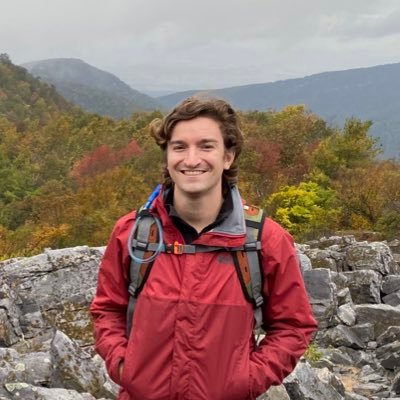
Rob Maxim
@robmaxim
Followers
3K
Following
17K
Media
455
Statuses
4K
Fellow at @BrookingsMetro writing about workers, tech, higher ed, and Indigenous communities. Mashpee Wampanoag 🌅 Views my own
Nacotchtank/Piscataway land-DC
Joined July 2009
A reminder, 400 years after the Mayflower, that the Wampanoag people are still here, still practicing our culture, and still facing adversity We didn’t just disappear or go extinct. And so I want to note some of the amazing things that we’re doing as a people (THREAD 👇)
72
17K
48K
My new piece for @nativenews_net: Biden designated the former Carlisle Indian School as a national monument. But now it will be the Trump Administration that creates it It's critical they acknowledge the true history of the abuses that took place there https://t.co/u0qKjZm3r5
nativenewsonline.net
Guest Opinion. President Biden earlier this month announced he would turn the former Carlisle Indian Industrial School into the Carlisle Federal Indian Boarding School National Monument. But it will...
0
6
8
A recent report co-authored by Robert Maxim and Glencora Haskins calls on the federal govt to commit to investments in Indian Country that reflect the profound trauma, economic damage and harms caused by the Indian boarding schools.
0
3
9
Let’s hope that Doug Burgum, Trump’s appointee for Interior Secretary, chooses to prioritize this. Burgum is currently the governor of North Dakota, a state with a significant Native population, and has received support from Tribal leaders https://t.co/cbIiqJPYFN
ictnews.org
Leaders from the Standing Rock Sioux Tribe and Sisseton Wahpeton Oyate expressed joy regarding President-elect Donald Trump’s nomination of North Dakota Gov. Doug Burgum as Secretary of the Interior
0
1
0
I wrote with @GlencoraH about some of the risks of a Trump presidency During his last term Trump promoted a so-called “patriotic education” commission that erased Native people. I can’t imagine he will prioritize teaching people about the boarding schools https://t.co/PQAHMPmMxK
brookings.edu
President Joe Biden issued an apology for the U.S. Indian Boarding Schools program, a century-long concerted effort by the federal government to destroy Native American culture
1
1
0
These are powerful actions by the president, but much of the implementation for both will fall to the Trump Administration. That makes me nervous. One of Trump’s first actions as president in 2017 was to scale back two national monuments. I worry that could happen with Carlisle.
1
1
0
As a descendant of a Carlisle School survivor and a Wôpanâak language learner, I’m grateful to see the president take these steps You can read some of the story of my ancestor, Lizetta Pocknett, and the language work our Tribe’s doing today in this piece https://t.co/n7PaT15O8T
capecodtimes.com
U.S. Indigenous boarding schools of the late 1800s and early 1900s resulted in generational trauma. The Weetumuw School in Mashpee hopes to heal.
1
1
1
President Biden will designate the former Carlisle Indian Industrial School as a national monument to tell the story of federal Indian boarding schools He will also unveil a 10-year Native language revitalization plan https://t.co/8JyEs1yc54
washingtonpost.com
The monument will be located in Carlisle, Pennsylvania, on the campus of a former flagship facility for reeducating tribal children. The U.S. once had more than 400 federal Indian boarding schools in...
1
3
4
So @Noahpinion, this is a genuine and good-faith offer: in the future I’d be happy to work with you to help you create some constructive ideas for Native-focused policy. I can also refer you to other Native folks working in your areas of interest. Don't hesitate to reach out!
0
0
1
The overall impression I get from his piece is that Noah finds land acknowledgements vaguely annoying, and has extrapolated a lot of takes about Indigenous land rights from that point of view. Before he had done so, I wish he had reached out to some Native scholars.
1
0
1
But, crucially, further weakening Tribal land rights won’t accomplish any of the economic development goals Noah sets out in the piece. What is needed instead is stronger and more proactive policy to STRENGTHEN Indigenous land rights in the U.S.
1
0
1
Having to navigate “trust land” can significantly undermine the ability of Tribes to participate in community and economic development projects. States can also in certain cases tax non-Native people and firms operating on Tribal lands, reducing Tribal competitiveness.
1
0
1
One is that a significant portion of Tribal land is still owned by the federal government and held “in trust” on behalf of Tribes. As such, Tribes often need to get Bureau of Indian Affairs approval to develop their own lands.
1
0
1
And while Noah names several Tribally led industrialization initiatives ongoing in the U.S., the reality is large-scale development can be quite difficult on Tribal land in the U.S. for a variety of reasons.
1
0
1
In other words, without an explicit recognition that Vancouver was Indigenous land, the developments Noah talks about wouldn’t be possible.
1
0
1
But the reason the Squamish Nation have been able to recover the Sen̓áḵw lands being used for development is because a Canadian court ruled that the Squamish Nation's homelands had been illegally stolen by the government of British Columbia, and returned a portion to them.
1
0
2
Noah does kind of get to the right position in the end. He says we should maximize Tribal autonomy and give more land back to Tribes. He also mentions some hard-won developments in Vancouver that are allowing the Squamish Nation to develop their Tribal land downtown.
1
0
0
There is an array of policy changes that I would like to see that are in the vein of “decolonization.” I’ve written about them in my work at Brookings. Most of them involve greater sovereignty and more robust funding for Tribes. None of them involve expelling anyone from the U.S.
1
0
0
It is quite common for Native people to have non-Native family members, because most Native American people are mixed-race. I can’t believe I have to say this, but Native people don’t want to deport their family members (or friends, colleagues, etc...). https://t.co/EyzDPKCOh9
brookings.edu
This January, the White House released proposals for reclassifying racial data collection in the 2030 census. Most notably, the proposals include combining race and ethnicity into a single question,...
1
0
2
I’m a Native person, an enrolled citizen of a federally recognized Tribe. But my mom is a non-Native person. My wife is also a non-Native person. I can very much say I do not want to expel either my mom or my wife—or anyone else for that matter—from the U.S.
1
0
3
I also take issue with his overgeneralization of “decolonization," particularly his view that decolonization means Native people want to expel non-Native people from the U.S. His view seems to be informed by some bad takes he’s seen on Twitter, not what actual Native people want.
1
0
2






